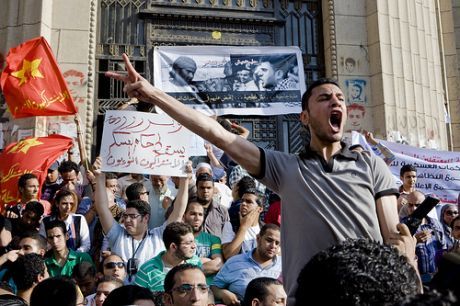News
You are here
Egyptians Continue To Challenge Military Rule

July 15, 2012
Egyptians are stepping up protest of military trials for civilians, exposing the increasing complicity of newly-elected president Morsi with the military regime and opening a new phase in the revolution.
Since the uprisings that ousted Mubarak began in January last year, more than 12,000 civilians, including children, have been tried in military courts. Egypt’s new president—the Muslim Brotherhood’s Mohamed Morsi—made election promises to end this practice, but has yet to do so.
Morsi formed a committee this month to explore the military trials issue, and it came out with a recommendation that he pardons the more than 2,000 civilians who remain imprisoned after military trial. The Muslim Brotherhood’s position on the issue is being called into question as Morsi continues to allow civilian cases to be referred to military court.
International law is explicit on this: everyone has the right to be tried by a competent, independent, and impartial tribunal. Trying civilians in military court is a direct violation of article 14 of the International Covenant on Civil and Political Rights (ICCPR).
Human Rights Watch (HRW) has issued a report demanding that Morsi use his presidential powers to pardon all civilians convicted in military tribunals and immediately end the practice. HRW has also renewed its call for amendments to the Code of Military Justice so that members of the military can be tried in civilian courts when they are charged with abuse of civilians. The current practice of sending these cases to military court has seen no reprisal for the human rights abuses by Egyptian military in the past year—including forced virginity tests on female protesters, torture of prisoners, and the killing of protesters at Maspero.
Egypt’s Army Generals are keeping a tight grip on the army, refusing to give up all control to Morsi. Hilary Clinton’s visit to the region created an upsurge in protests against US interference in Egyptian affairs. The US is allegedly working on an agreement with Morsi for the Muslim Brotherhood to pressure Hamas to sign a deal with Israel.
Much of the Muslim Brotherhood’s base, especially its youth, have been part of the revolution and their aspirations have been raised by the election of Morsi. But Morsi and the the leadership is increasingly complicit with the military and their US masters. This is opening a new phase in the Egyptian revolution, as people continue to challenge the repressive and neoliberal military regime. As the Egyptian Revolutionary Socialists explain:
“This glaring contradiction—between a presidency denuded of its powers, unwilling and unable to realise any of the revolution’s demands, and the hopes and aspirations of the masses generated by the temporary defeat of counter-revolutionary forces—is a major determinant of the current situation…We will participate in building a revolutionary front that is independent of the Muslim Brotherhood and the liberals, one that is implacably hostile to the military, to the remnants of the old regime, and to anyone who wants to stop or end the revolution. Despite the temporary retreat of the movement in the streets, there is a new wave of strikes and social protests which will launch the next phase of the Egyptian revolution.”
Section:
Topics:
- Log in to post comments









